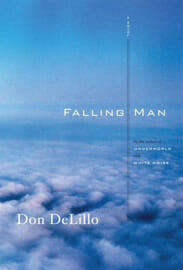Don Delillo: The Falling Man

Fiction after the walls come tumbling down
To possess such talent as Don DeLillo and then target the very real heartbreak and human drama of 9/11 as some whiff of voyeurism or indiscretion that seems nearly cruel, almost brutal. Is it wrong? Should the author be whipped and mocked for sifting New York’s settling ashes now, or ever? Or is this manner of coming to terms with loss totally necessary, and even outrageously funny at times, with laughter, that great medicine, liberally applied? These are some of the many questions that course through the mind while reading DeLillo’s soaring latest effort, Falling Man. It’s a much welcomed return to the author’s best work, after the less-than-satisfying Cosmopolis (2003), a book that doggedly follows a billionaire across Manhattan in search of a haircut—hard to accept, in any sense, as a necessary read.
What is necessary, it turns out, is moving on. Most of us relive that day, 9/11, when our courage can actually be screwed to the sticking point, through feature films, documentaries, books, reports and various other seemingly disjointed tales that crossroad, connect briefly and then move on. Here, in a welcome turn, DeLillo distills the wacked-out post-9/11 haze into a touching read (piercingly funny, at times, despite every jangling instinct) that offers much sense, in its fine prose, for utter senselessness.
DeLillo unspools the kind of storyline late filmmaker Robert Altman no doubt loves right now, looking down with interest from his big director’s chair in the sky at the ultimate movie. As in Nashville and Gosford Park and other Altman Alt-realities, DeLillo characters cross and uncross paths—all seeking, searching, assessing and reassessing their lives—in the dazed, near-apocalyptic hangover that blanketed New York City in the wake of the twin towers falling like Jericho’s walls.
-

-

-

-

-

-

-

-

-

-

-

-

-

-

-

-

-

-

-

-

-

-

-

-

-

-

-

-

-

-

-

-

-

-

-

-

-

-

-

-








































